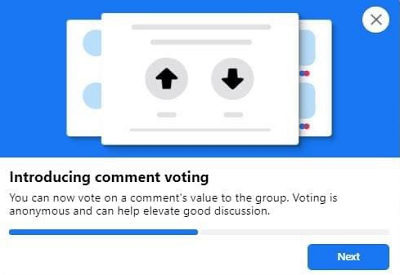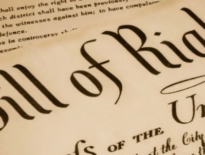
For a few months now, Facebook has been gently testing post voting changes that might substantially change our experience with comments and posts on the dominant social media platform. Today, the feature rolled out more broadly, sparking more and more reaction to the changes and a litany of “why??” questions from frequent Facebook users.
What sparked my reaction, this reaction, was less an observation of the change itself, but rather the “why?” For years now, through my work and role in MediaTech Ventures, we’ve been a party to much of the social, political, and legal discussions of social media, and Facebook in particular, as policy makers (and politicians the world over) wrestle with the implications of social networks and platforms.
Article Highlights
Facebook is making token changes
Social media is making changes for the sake of appearances; and before you go presuming I mean that critically, appreciate that I don’t – I’m stating it because it’s the “why?” and it’s important that we all appreciate what’s being done to social media, causing its reactions.
Today Facebook is rolling out more Upvotes and Downvotes, despite having Thumbs Up Likes and Angry Faces. Do we really need that? Will it really change much? Their algorithm is already among the most brilliant and valued in the world, evident in nearly 3,000,000,000 people happily connecting away on Facebook. This is a change that won’t really change anything – and which will probably be removed once that is proven out (and it’s accomplished the other goal of looking like changes are being tried). They’re doing these things for a reason… and that reason isn’t the blatantly obvious feature, they’re playing second level chess; they’re moving pieces in a longer game.
Social Media has been getting skewered by governments over privacy, security, monetization, and the impossible situation of curating or not.
To force the political support of Facebook’s wealth and influence, Australia, the U.S., and other countries are tearing into “Facebook” (it being the primary target). Facebook, it seems, won’t just cave to what countries want so instead they’re fighting back.
The first bit of evidence of that fighting back was in Australia, when, because of Rupert Murdoch’s wealth and influential media network, the government there tried passing requirements that any “news” shared by someone on Facebook, obligated Facebook to pay the News Publisher. Facebook said F that (in not so many words) and implied that they’d just censor any news shared within the country of Australia. Chess. News shared on Facebook results in billions of visits to news articles; without Facebook (and Google), most news sites would be dead. Facebook called a bluff and indeed, the government backed away from the most stringent of policies, made concessions, and Facebook continues driving audiences to Publishers in Australia.
Facebook is “Social Media” – it’s the very definition of being in public, online. And yet, for years now, traditional media and politicians have been criticizing Facebook for using data it creates about people (for *not* being private or secure).
We see the result, people (average people) are increasingly asking if Facebook is private, what they do with “our” data, and expecting that we control how we’re monetized; Facebook is losing the war through hearts and minds.
Thing is, none of those criticisms of Facebook are valid — it’s very known (by those of us who work in this stuff) that it’s NOT private, it’s not secure, and it absolutely makes money off us. That’s why it’s FREE to use.
So what’s Facebook to do??
The first logical and appropriate answer was “we’re a platform not a publisher” and Section 230, U.S. law from the Clinton era, is a legal protection related to that fact. However, while Facebook is in the legal (and ethical, I argue) right, they’re continuing to lose the brand war of hearts and minds because of the impossible situation.
Platform or Publisher. The impossible situation
That’s an impossible situation because these sites have always argued that they are platforms and therefore do not moderate posts. They might remove something, and certainly people need to comply with their T&Cs, but they don’t APPROVE posts coming in; they don’t screen them; they don’t ‘accept’ them. As a result, they aren’t the “publisher” – YOU are, we are. We publish.
Problem with that position is that it causes the criticism, and the political ammunition, that Facebook is “allowing” bad things – hate speech, racism, etc.
That makes Facebook look bad. And while it wasn’t actually (necessarily) “allowing” such posts, because Facebook doesn’t screen and approve what goes up, it’s hard to defend the argument that they aren’t preventing it. Worse, it’s a slippery slope circumstance because what people consider appropriate is a personal and subjective opinion. While we, in the U.S., might all agree that something is never acceptable, or that it is, another country might have completely different standards and expectations.
A platform doesn’t screen, edit, and approve. It responds to.
All social media sites have guidelines and Terms & Conditions about what they allow on the site, and yes, those sites have every right to ban or censor whatever they want (that has nothing to do with “free speech”); but those are guidelines, not guarantees, because these are PUBLIC spaces and shit happens (is swearing acceptable?).
Under attacks that it’s not private, it’s not secure, that it monetizes people, and now too, that it allows hate speech, incites to attack, and worse, Facebook did what first?
They started removing more content. They started censoring. They banned U.S. President Trump.
And that caused the argument that they’re NOT a platform, that they’re on the other side of the coin: A Publisher.
“After all, if they clearly won’t allow Trumps posts, they’re editing aren’t they? They’re making a decision about the content allowed.”
Frack. Being a Publisher means they are responsible for the content. All of it. Responsible for screening it and arguably, paying for it. They can’t let that happen; validly and correctly, they can’t let that happen: they are not a publisher. They’re not a publisher, you are, we are. I am, I wrote and published this.
But now that argument is made, putting more pressure on Facebook and putting them in that impossible situation… “Platform” then stay out of content and deal with the fallout and criticism that they aren’t preventing bad stuff (every conceivable bad thing everywhere in the world) or “Publisher” and moderate everything while also paying for everything, a circumstance unrealistic and impossible to do – because then it technically isn’t social media.
Bringing us to this latest feature.
It’s a token. It’s an impotent feature. We already “Like” a post (or show our Anger); we need another Up or Down vote??
And this particular change isn’t the first, it’s another in a list of recent changes aimed at “doing something” about the attacks and criticism so that Facebook can go back to being a Platform for people to connect and communicate – warts and all.
These changes enable Facebook to evolve the brand from “we’re a platform and don’t moderate anything” through the no-win situation, into “look at all the things we’re trying to do to make this work better.”




Paul O’Brien VERY cogent argument, and one I think you already know I’m in agreement with.
For anyone reading in, check out Paul’s editorial (above and his link) and if you’re still thirsty, here’s why our policy was officially set to treat Facebook as MEDIA, not TECH: https://theamericangenius.com/social-media/media-v-tech/
Very well thought out – thanks for sharing Paul.
Love this discussion, Paul. So many thoughts!
Except publishers also are promoters. And they promote some things over others.
Philip Wheat Sort of… I suppose, same challenge of a no-win situation. Yes, they are promoting and favoring but they’re doing it on their platform, not elsewhere, and they’re doing it in consideration of what the person on the site wants (or has favored in the past).
Let’s be realistic, if you’re a Biden supporter, Facebook isn’t pushing you Pro-Trump content. And vice versa. That is, unless you actually engage with it (and they make money because of that).
Good point, has me thinking.
It would be interesting to see you contrast the model of Facebook with that of Reddit where moderation IS a thing, but it’s not the platform doing the (majority of the) moderating.
Also calls to mind the fact that politically extreme posts and Groups are still huge, and active, on Facebook… that on reddit, not even their owners (Tencent’s investment) can prevent anti-China sentiments… and that on reddit, you can absolutely find just about anything (that, if we really stay OUT of moderating platforms, most might not like what we get)
In any event, that was my thought at the end, we might have to rethink OUR expectations, rather than expecting governments, or holding the companies, accountable for social media.
Soon, AI will probably filter what you are allowed to post & say. Actually, it’s already happening. 🙁
That and, I’m really hot on trying to wrap my head around how distributed computing might make this all moot.
Can’t get myself there yet but things like an NFT of a person (BitClout where I’m poking around) makes it conceivable that the only person who owns and is accountable for the content, is the clear source and individual. Here if you want to poke around: https://bitclout.com/u/paulobrien and Renata George just got my attention there with some articles on the subject as MediaTech Ventures wraps our startup founders’ heads around possibilities.
Thank you, Paul. Again, as Patrick commented, an exceptionally well thought out post.
So might I suggest that in addition to holding the writer accountable, the platform accountable, the publisher accountable, that the reader too, must have a level of accountability as to understanding and questioning what he or she reads.
FB is adopting Reddit features and it’s weird… I don’t like it… I get it, but I don’t like it…
Brandtley McMinn me thinks it’s to make all Groups and posts more community moderated; distancing them from whatever content is there.
reddit has porn, hate speech, and even calls to arms in China (with Tencent being a major investor)…. no one judges reddit because there is *someone* else there running those communities.
Paul O’Brien Except Facebook can’t figure out who I am, so it keeps trying random things. Part of the fun of having so many people on multiple sides of issues. The fact that I have plugins to fight their algorithms might have something to do with that as well. ?
Facebook is neither “Publisher” nor”Platform”, Paul. At a point when audience growth is no longer an option, limited today by outside platforms (see Apple, Samsung, and Google) Facebook is now nothing more than a “media network.” The perceived controls, upvotes and downvotes, are the “what’s next” of likes and shares, not controls of any real effect.